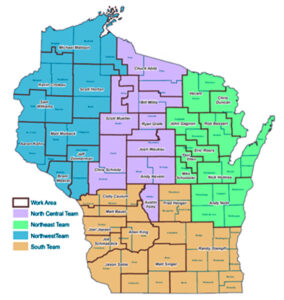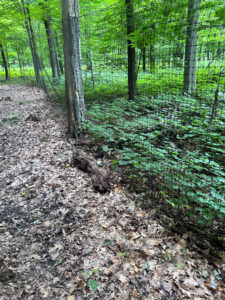
This map shows the Managed Forest Law management zones. / Map Credit: Wisconsin DNR
Back in August, a team of third-party forest certification auditors made their annual trip to Wisconsin to evaluate the performance and administration of the MFL Certified Group to American Tree Farm System® and Forest Stewardship Council® standards.
Over the week of Aug. 12, auditors visited 85 sites in the counties served by the Northeast Tax Law Team. This audit was even more successful than last year, with only a single audit finding and no corrective actions needed. That marks the first annual audit in the history of the MFL Certified Group (dating back to 2005) which resulted in zero corrective action requests!
MFL landowners, consulting foresters, loggers and DNR personnel all can take pride in that accomplishment because the close collaboration of all these stakeholders is required to achieve the rigorous level of certified forest management on MFL lands. Likewise, a huge thank-you goes to the 24 landowners, 12 private sector foresters and four loggers who took time out of their schedules to participate in the field visit portion of the audit, to the landowners of the 80-plus audit sites, to all the DNR staffers from the Northeast Tax Law Team who administer the program and organized the audit routes, and finally to everyone who responded to the solicitation for feedback.
MFL forest certification audits run on a five-year cycle that begins with a comprehensive re-evaluation, followed by four “surveillance” audits. The audit this year was the full re-evaluation, which requires more audit sites and looks at all forest certification criteria and indicators rather than focusing on a subset of indicators. This only further exemplifies how far the MFL Certified Group has come to achieve a “clean” audit, even when looking at more sites and with a greater magnifying glass.
The successful result of this year’s re-evaluation audit is a direct result of some of the MFL program strengths that the third-party audit team noted in their closing meeting.
- The MFL program demonstrates a strong commitment to continuous improvement.
- Overall, landowners have a high level of satisfaction with MFL.
- DNR staff assume roles as instructors and mentors of forest management for landowners.
- There is a “community” of MFL that includes landowners, consulting foresters, loggers, timber buyers, land managers and DNR staff in which each community member contributes to nurturing relationships, understanding and success of the MFL program.

An example of deer browse limiting successful forest regeneration in Shawano County. The fencing was installed after the harvest and clearly demonstrates how deer browse is negatively impacting tree regeneration and overall forest ecology. / Photo Credit: Paul Etten, Wisconsin DNR
The American Tree Farm System evaluation provided the sole observation this time around. The audit team is justifiably concerned with the long-term impacts of deer herbivory on forest regeneration in some parts of the state. This is not a new concern and is also shared by the MFL program. Likewise, a comprehensive regeneration monitoring initiative has been planned over the past two years and was rolled out for the first time late this summer. The audit finding is a means to document an opportunity during next year’s audit to evaluate the implementation of the regeneration monitoring and indicate any subsequent action taken or prescribed because of regeneration monitoring efforts.
The final public audit reports are pending and will be posted to the MFL Certified Group Webpage when they become available.
The 2024 annual forest certification audit will begin in August, covering field sites in the South Tax Law Team’s area.
